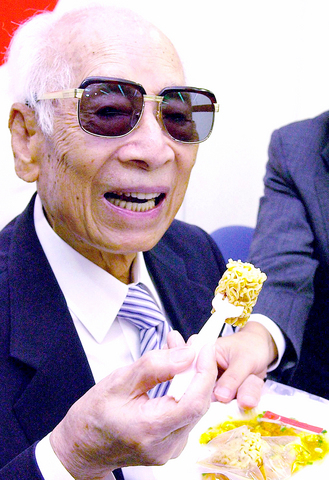Japan yesterday bade farewell to Momofuku Ando, known as the inventor of instant noodles that have become a global household product, after he died aged 96.
Ando died of acute heart failure on Friday, said Nissin Food Products Co, the company he founded in 1948 in the aftermath of World War II and built into a multi-billion dollar empire.
Japanese newspapers published lengthy obituaries of the businessman yesterday with the influential Asahi Shimbun praising him for bringing "instant noodles to the world and into space."

PHOTO: AP
The mass-circulation Yomiuri Shimbun said Ando started from scratch in developing an instant noodle which has "grown with the age of mass consumption" and added "a new chapter in the history of the world's food culture."
Born Wu Bai-fu (
After founding the precursor of Nissin, Ando put on the market "Chicken Ramen," the first instant noodle product, in 1958. The chicken-flavored dried noodle cake could be served in minutes by pouring hot water over it in a bowl.
He invented the product, which soon became a hit, at a time when his business ventures were in trouble. As managing director of a credit union that went bankrupt, he had given up his assets to cover the debt.
In his biography, Ando said he was inspired to develop the product when he saw a long line of people waiting to buy a steaming soup noodle at a black market stall in a war-ravaged city.
"Peace prevails when food suffices," he said.
Sales of Chicken Ramen rocketed after Japan's number-one general trading house Mitsubishi Corp was commissioned in 1959 to help promote the product as the country was taking off on its rapid post-war industrialization.
In 1970, Nissin established its US subsidiary, Nissin Foods (USA) Inc, and in the next year launched the "Cup Noodle," a pre-cooked slab of noodles in a waterproof styrofoam container.
Nissin has led the global instant noodle industry which sells 85.7 billion servings each year. Nissin's annual sales of instant noodles amount to 10 billion single servings in 10 countries.
Ando opened a museum of instant Ramen in Osaka in 1999 and retired from the chairman's post in 2005 to serve in an honorary role as founder-chairman.
In 2005, Nissin supplied a vacuum packed instant noodle or "Space Ram" to Japanese astronaut Soichi Noguchi aboard the US space shuttle Discovery.
"It is like a dream that people from rivaling countries can eat Ramen together in space," Ando told reporters at that time.
According to the Mainichi Shimbun, Ando was last seen in public on Wednesday when he made a New Year's speech at Nissin's head office in Osaka and had a lunch with executives, a bowl of Chicken Ramen with rice cake.

In Italy’s storied gold-making hubs, jewelers are reworking their designs to trim gold content as they race to blunt the effect of record prices and appeal to shoppers watching their budgets. Gold prices hit a record high on Thursday, surging near US$5,600 an ounce, more than double a year ago as geopolitical concerns and jitters over trade pushed investors toward the safe-haven asset. The rally is putting undue pressure on small artisans as they face mounting demands from customers, including international brands, to produce cheaper items, from signature pieces to wedding rings, according to interviews with four independent jewelers in Italy’s main

Japanese Prime Minister Sanae Takaichi has talked up the benefits of a weaker yen in a campaign speech, adopting a tone at odds with her finance ministry, which has refused to rule out any options to counter excessive foreign exchange volatility. Takaichi later softened her stance, saying she did not have a preference for the yen’s direction. “People say the weak yen is bad right now, but for export industries, it’s a major opportunity,” Takaichi said on Saturday at a rally for Liberal Democratic Party candidate Daishiro Yamagiwa in Kanagawa Prefecture ahead of a snap election on Sunday. “Whether it’s selling food or

CONCERNS: Tech companies investing in AI businesses that purchase their products have raised questions among investors that they are artificially propping up demand Nvidia Corp chief executive officer Jensen Huang (黃仁勳) on Saturday said that the company would be participating in OpenAI’s latest funding round, describing it as potentially “the largest investment we’ve ever made.” “We will invest a great deal of money,” Huang told reporters while visiting Taipei. “I believe in OpenAI. The work that they do is incredible. They’re one of the most consequential companies of our time.” Huang did not say exactly how much Nvidia might contribute, but described the investment as “huge.” “Let Sam announce how much he’s going to raise — it’s for him to decide,” Huang said, referring to OpenAI

The global server market is expected to grow 12.8 percent annually this year, with artificial intelligence (AI) servers projected to account for 16.5 percent, driven by continued investment in AI infrastructure by major cloud service providers (CSPs), market researcher TrendForce Corp (集邦科技) said yesterday. Global AI server shipments this year are expected to increase 28 percent year-on-year to more than 2.7 million units, driven by sustained demand from CSPs and government sovereign cloud projects, TrendForce analyst Frank Kung (龔明德) told the Taipei Times. Demand for GPU-based AI servers, including Nvidia Corp’s GB and Vera Rubin rack systems, is expected to remain high,